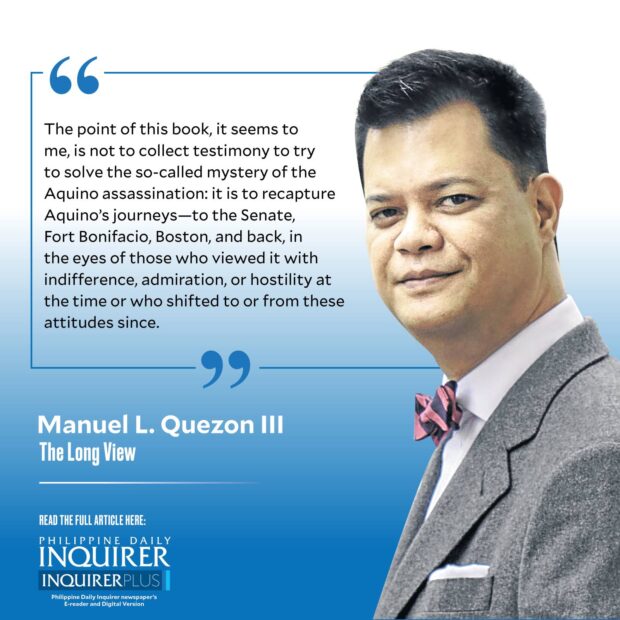Bearing witness
 Today, a book titled “A Death Foretold” is being launched at the Ayala Museum. Its subtitle is “The Ninoy Aquino Assassination Remembered.” I have the honor of speaking at the launch, and so I won’t preempt myself. But for readers who can’t be there, I thought I’d share some additional thoughts on this project and why it matters.
Today, a book titled “A Death Foretold” is being launched at the Ayala Museum. Its subtitle is “The Ninoy Aquino Assassination Remembered.” I have the honor of speaking at the launch, and so I won’t preempt myself. But for readers who can’t be there, I thought I’d share some additional thoughts on this project and why it matters.
It only seems to have entered the minds of the editors in passing, but for readers of both a certain age and literary inclinations, the title can’t fail to strike a chord of memory, since the 1980s were, for many readers, a time of “magical realism,” in which the imagination of Gabriel García Márquez filled the void left by the silenced imaginations of our own crafters of “Tropical Baroque” like Nick Joaquin: We found echoes of our own condition in the feverish ravings of “A Hundred Years of Solitude,” and identified with the sickly sweet stench of decay that permeated “The Autumn of the Patriarch”; in particular, in “Chronicle of a Death Foretold,” provoked a uniquely warped kind of déjà vu which took place among those who read it when it came out in English in 1982, only to find reality trumping fiction with the political murder that defined a generation that took place in 1983. Here was an entire national community implicated in a murder that, in retrospect, unfolded in unstoppable fast, then slow, motion.
Last week, I pointed out why, on the 40th anniversary of Benigno “Ninoy” S. Aquino Jr.’s assassination, to insist, as many still do, that the perpetrator remains unknown is to ignore how then President Ferdinand E. Marcos Sr. took ownership of the murder by using every power at his disposal, to absolve the officers and enlisted men implicated in what his own investigative commission declared could be nothing less than a military conspiracy. To be sure, as far as the law is concerned, only a few could be convicted because the trail ended with Fabian Ver who went into exile with the Marcoses. But then that is the whole point of political liquidations: to render the law and the institutions that uphold it, incapable and, thus, incompetent.
In the book being launched today, over 130 individuals, from the point of view of a wide variety of backgrounds and political beliefs, talk about Aquino, before, during, and after, those 11 seconds of destiny—from the moment bystanders lost view of him in the loading dock at the Manila airport, to the first shot being heard—that marked the transformation of what had, up to then, been a battle of the wills between Aquino and Marcos, into a battle for survival, between Marcos and the Filipino people.
Whether in film—Akira Kurosawa’s “Rashomon”—or on TV—the pun-addicted “CSI”—or in novels—Marquez’s “Chronicle of a Death Foretold”—the one thing we are told to be sure of, when it comes to witnesses who are sure of themselves, is that you can be sure that they are unreliable. This is because they can lie to investigators, or lie to themselves, often without malice, and in the wholehearted sincere belief that they are recounting the Gospel truth. And so we put our faith in science, on the assurance that forensics will reveal what testimony cannot. This is useful and even necessary in the determination of fact. But we also can, and often do, turn to acts of the imagination, to literature, and acts of compilation, of reportage, or history, to make sense of past times, or get a sense of those times, knowing all too well how fallible the memories of witnesses can be.
And yet we want to hear, see, read testimony. Not so much for the facts, though each of us likes to play amateur detective, even to the point, like the narrator, who is the author, in “Chronicle of a Death Foretold,” when he encounters the mother of the murdered man: “I found her prostrated by the last lights of old age when I returned to this forgotten village, trying to put the broken mirror of memory back together from so many scattered shards.” For each shard is itself a complete mirror, reflecting the one and only truth, in the end, the one giving testimony, is capable of bearing witness.
Readers of a religious inclination, understand this compulsion, that to bear witness is a near-sacred thing: Just as bearing false witness is, literally, a profanity. The point of this book, it seems to me, is not to collect testimony to try to solve the so-called mystery of the Aquino assassination: It is to recapture Aquino’s journeys—to the Senate, Fort Bonifacio, Boston, and back, in the eyes of those who viewed it with indifference, admiration, or hostility at the time, or who shifted to or from these attitudes since.
Go find Good Intentions Publishing on Facebook and order your copy today.